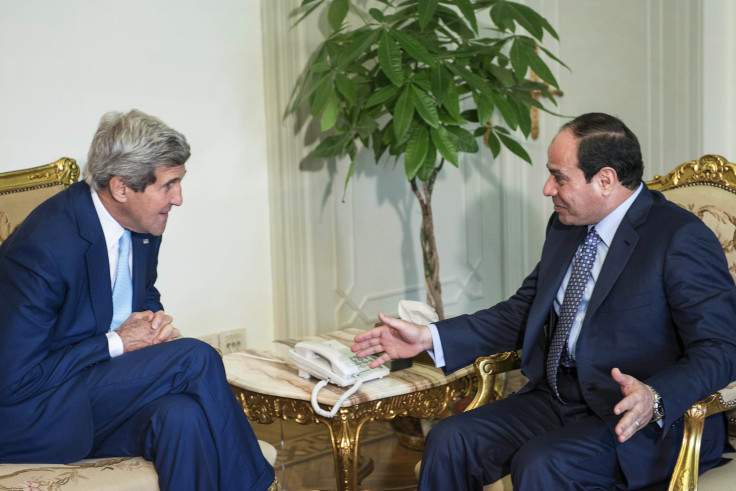Kerry's Middle East Debacle

It already seems like a quote that the American Secretary of State John Kerry wishes he could take back: On Sunday, just after he met in Cairo with with newly elected Egyptian president Abdel Fattah el-Sisi, Kerry confirmed that Washington would resume providing military aid to Egypt, calling American relations with his government “notably warm.”
Kerry added that he believed el-Sisi was committed to human rights -- a spirit that emerged in the course of what he described as a wide-ranging conversation. “We also discussed the essential role of a vibrant civil society, free press, rule of law and due process in a democracy,” Kerry told the NYT.
But hours after the visit concluded, an Egyptian court Monday convicted three al Jazeera journalists of conspiring with the Muslim Brotherhood to broadcast false reports of civil strife in the country. The reporters -- Mohamed Fahmy, a Canadian-Egyptian, Peter Greste, an Australian, and Baher Mohamed, an Egyptian -- were sentenced to between seven and 10 years in prison.
In response to the news, Kerry released a statement through the State Department condemning the conviction as “chilling and draconian” and said that “injustices like these cannot stand.” For the Secretary of State, the contrast was striking: One day after his happy announcement that ties between U.S. and Egypt were restored, Kerry was forced to condemn the country for an event he and el-Sisi reportedly discussed.
This about-face then raises an awkward question: Was the United States so eager to restore ties with Egypt -- long a crucial American ally in the Middle East -- that it was willing to overlook a basic human rights violation?
Shadi Hamid, an Egypt expert at the Saban Center at the Brookings Institute, criticized Kerry’s performance on Twitter:
It's not just Kerry's comments on #Egypt reflect bad policy; it's that they're embarrassing. Why does the US need to grovel to Sissi?
— Shadi Hamid (@shadihamid) June 23, 2014
Kerry's praise for Sissi & #Egypt was so over-the-top. Really raises question of just how cynical he is (or, worse, that he believes it).
— Shadi Hamid (@shadihamid) June 23, 2014
The United States' shift in policy toward Egypt provides a neat illustration of how Washington’s options in the Middle East have narrowed. Relations between the United States and Egypt had been strained since last July, when el-Sisi, then serving as general, deposed Prime Minister Mohammed Morsi in a coup d’etat. In response, Washington condemned the coup and suspended military aid to Cairo, pending progress on democracy and human rights.
But in the ensuing months, as both Syria and Iraq destabilized further, the U.S. softened its criticism of el-Sisi, who obtained 96.91 percent of the vote in elections held earlier this month.
The contrast between Kerry’s positive spin on the meeting with al-Sisi and the conviction of the journalists wasn’t lost on the journalists themselves. As the judge’s sentence was being read in a Cairo courtroom, Mohammed Fahmy, one of the three men sentenced to at least seven years in prison, yelled out “Where is John Kerry?”
© Copyright IBTimes 2025. All rights reserved.






















